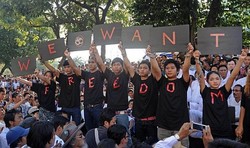AFP | 6 January 2013
Thousands turn out for Yangon protest
Yangon: Several thousand people joined a rally in Myanmar's main city on Sunday to call for the abolition of repressive laws and an end to politically related arrests.
The crowd gathered for about two hours near Yangon City Hall, chanting slogans such as "Give citizens full rights!" and "Freedom!"
Myanmar said on December 31 that it was releasing its last remaining political prisoners under a sweeping amnesty.
But about 35 political detainees remain locked up despite the pardon, according to activist Pyone Cho of the 88 Generation group which organised the rally.
"We do not accept any kind of political arrest," Pyone Cho told AFP.
President Thein Sein, a former general, has won international praise and the removal of most western sanctions for overseeing new political and civil freedoms.
He had vowed to free all political prisoners by the end of 2013 and it is unclear why some apparently remain behind bars.
Arbitrary imprisonment was a hallmark of nearly half a century of harsh rule by a junta that denied the existence of political detainees, even as it imposed harsh punishments on rights activists, journalists, lawyers and performers.
Before Myanmar's reforms, rights groups accused the country of holding about 2,000 political prisoners.
Campaigners fear authorities could continue to detain critics in the future, and remain concerned about legislation that forbids protests without permission.
Arrests stemming from land grabs are also a concern.
Protester Tun Lin Aung said about 200 farmers from his village in the Irrawaddy Delta region were in prison for trespassing due to land disputes.
"There is no one to help us. We would like to ask the president to release all our villagers. There are many schoolchildren missing their parents who were charged and sentenced as they ploughed farmland," he said.
Demonstrators also called for the amending of the junta-drafted constitution, which reserves a quarter of the seats in parliament for unelected military personnel and bars opposition leader Aung San Suu Kyi from becoming president because her sons are British.
Thousands turn out for Yangon protest
Yangon: Several thousand people joined a rally in Myanmar's main city on Sunday to call for the abolition of repressive laws and an end to politically related arrests.
The crowd gathered for about two hours near Yangon City Hall, chanting slogans such as "Give citizens full rights!" and "Freedom!"
Myanmar said on December 31 that it was releasing its last remaining political prisoners under a sweeping amnesty.
But about 35 political detainees remain locked up despite the pardon, according to activist Pyone Cho of the 88 Generation group which organised the rally.
"We do not accept any kind of political arrest," Pyone Cho told AFP.
President Thein Sein, a former general, has won international praise and the removal of most western sanctions for overseeing new political and civil freedoms.
He had vowed to free all political prisoners by the end of 2013 and it is unclear why some apparently remain behind bars.
Arbitrary imprisonment was a hallmark of nearly half a century of harsh rule by a junta that denied the existence of political detainees, even as it imposed harsh punishments on rights activists, journalists, lawyers and performers.
Before Myanmar's reforms, rights groups accused the country of holding about 2,000 political prisoners.
Campaigners fear authorities could continue to detain critics in the future, and remain concerned about legislation that forbids protests without permission.
Arrests stemming from land grabs are also a concern.
Protester Tun Lin Aung said about 200 farmers from his village in the Irrawaddy Delta region were in prison for trespassing due to land disputes.
"There is no one to help us. We would like to ask the president to release all our villagers. There are many schoolchildren missing their parents who were charged and sentenced as they ploughed farmland," he said.
Demonstrators also called for the amending of the junta-drafted constitution, which reserves a quarter of the seats in parliament for unelected military personnel and bars opposition leader Aung San Suu Kyi from becoming president because her sons are British.














